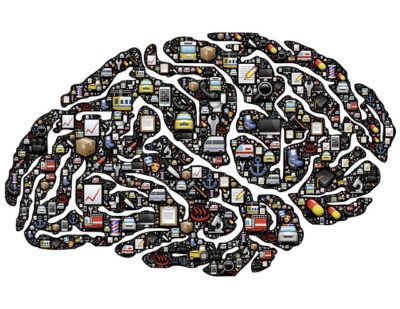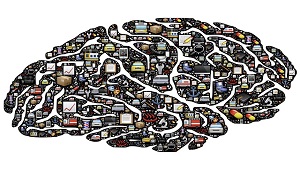Psychological Benefits of Video games

When asked, most parents will admit that their kids spend too much time starting at one screen or another. Adults alike are often guilty of the exact same thing. But did you know that time spent gaming may actually have significant psychological benefits for young and old alike? While moderation is best for screen time, the time you spend gaming can actually boost your brain power. Let’s take a look at the top 10 ways that gaming can impact you and your children for the better.
Cognitive Benefits of Gaming

Psychologists refer to our inner thought processes as cognitions. Our brains are like a well-oiled machine and the product of it’s hard work are our thoughts, or cognitions. What research has shown is that certain kinds of video games can give children and adults a pretty significant cognitive boost. Scientists have found that there are several benefits of video game playing, specifically action video games. These kinds of fast-paced games can help train not just our basic sensory and attentional abilities, but also in higher-order, executive abilities. One study found that adults and children who engaged in shooting or action style games showed a considerable improvement in their spatial skills. This study also indicated that action games were successful in promoting decision-making skills, memory, attention and higher levels of creativity.
The Social Implications of Gaming

Another psychological benefit of spending time with your favorite gaming monitors comes in the form of enhanced social skills. When you think of gaming, you think of solo-game play in a dimly lit room. What this daydream doesn’t conjure up is the power of the social network built into the games themselves.
A 2016 study conducted at the Columbia University’s Mailman School of Public Health in New York set out to investigate two important questions. First, do children who spend time gaming have similar social intelligence as peers who do not play video games? Second, does gaming have any implications on overall academic success? What they found was astounding.
Their research showed that children who engaged in moderate to high video game usage had a 1.75 time increase in their intellectual and social functioning. These children were also found to be 1.88 times more likely to have “high overall school competence.” What this study helped clarify is that children who game are as socially successful, if not more so than children who don’t play video games.
Games Positively Impact our Visual Attention
The term visual attention is a little different than what we might think of with traditional attention. Visual selective attention is the process your brain utilizes when faced with a high volume of stimulus. Our brains are forced to quickly prioritize information for neural processing and make decisions about what pieces of information can ignored.
When you consider the visual attention of someone who regularly plays videos games, scientists have found that they are much more effective at making these split second decisions. Gamers develop the ability to decide what elements are important and what are secondary in an instant. What is important about this skill is that it can be applied to a wide range of situations outside of video games.
Improved Spatial Attention
In addition to visual attention, researchers Green and Bavelier also found that action video gaming enhances our ability to quickly locate a target stimulus in a field of distracting stimuli. Think of trying to find the lone x in a field of z’s. Video gamers have a serious knack for this kind of test. The value in this finding is that spatial attention skills are very important for life tasks like driving ability and overall awareness of your environment.
Increased Processing Speed
An additional advantage that is commonly seen among active video gamers is the ability to process information in their environment and make sense of what to do with it very quickly. When playing a game, these are people who can rapidly interpret the information on screen, make a decision on how to respond and quickly do so. This skill easily translates into just about every other task we do. From driving to watching television, we are constantly gathering information from our environment and making sense of it.
May Even Help Treat Dyslexia
Dyslexia is a widely misunderstood learning disability with some roots in difficulty with visual attention. Interestingly, recent studies have shown that the many benefits of video gaming may help children and adults with dyslexia see an improvement in their learning difficulties. One study showed that as few as 12 hours of video game play led to an improvement in dyslexic children’s scores on tests of reading and phonology. Taking this even a step further, this drastic improvement was equal to or better than many training programs specifically designed to treat dyslexia. For parents who have spent years trying to help their children, the answer might be as simple as the right gaming monitor and video game system.
The Link Between Gaming and Memory
An important study published by the American Psychological Association (APA) in 2014 set out to describe the range of psychological skills that can be seen as a result of video game play. One of the interesting points they made was about the unexpected improvement in memory. When looking at games like shooter or action games, people who spend a moderate amount of time playing these games have heightened memory skills, for both short term and long-term memory. While the why is not widely understood at this point, the implications are powerful.
A Boost in Problem Solving
Still another benefit of video gaming for both children and adults is in our ability to successfully problem-solve. Some people have an innate ability to find solutions to problems. But for many other, problem solving can be a difficult task. What some studies suggest is that people who play video games experience a considerable boost in their ability to problem solve. Games that involve strategy also require the ability to seek alternative solutions to complex problems. The central value to this finding is how these skills apply to much more than video games. Playing video games can help people become better problem solvers at school, at work and in their everyday lives.
Gaming Helps Reduce Stress Levels
How powerful would it be if lower stress levels were just a video game away? A 2009 study published in the Journal of CyberTherapy & Rehabilitation showed that casual video game play has been scientifically associated with a reduction in stress levels. Beyond just lowering stress levels, the researchers also found that playing video games can also help mitigate the effects of stress on the body.
These are just a few of the potential psychological benefits of gaming. In recent years researchers have moved away from placing strict time limits on screen time, instead recommended that adults and children make the most of their screen time. With so many potential benefits of video game playing, time spent gaming can be much more beneficial than time spent mindlessly scrolling through social media. From increases in memory to better problem-solving skills, gaming is a great way to train your brain.
So, when you consider ways to help both yourself and your child do and be better, gaming might be a great option. It doesn’t have to cost a fortune with a number of affordable home theater projectors under $500 currently available. It might just be a small investment in you and your child’s future.

